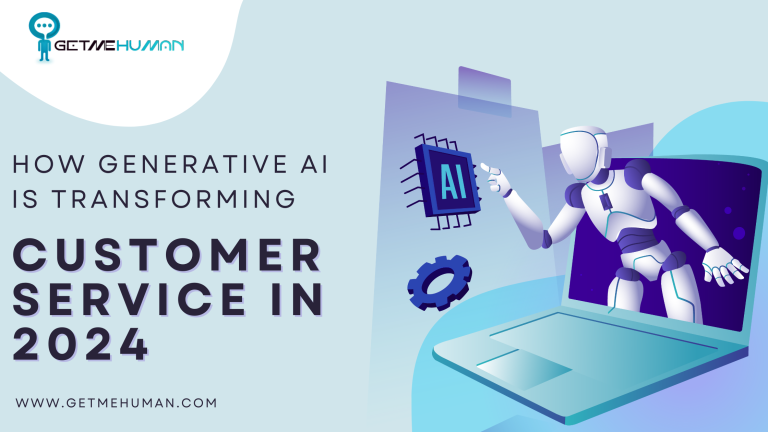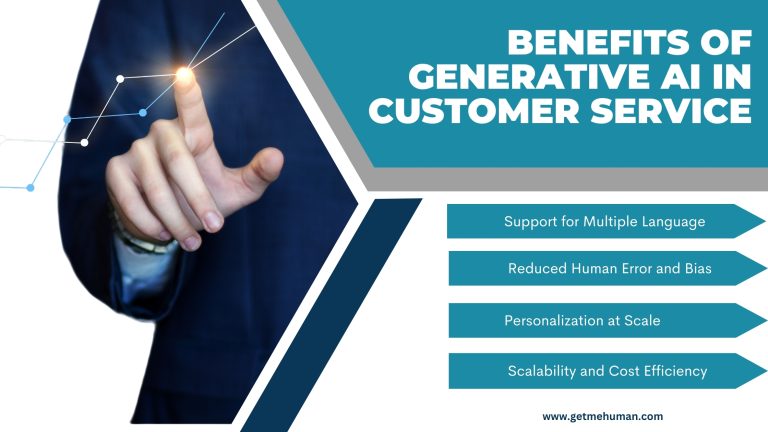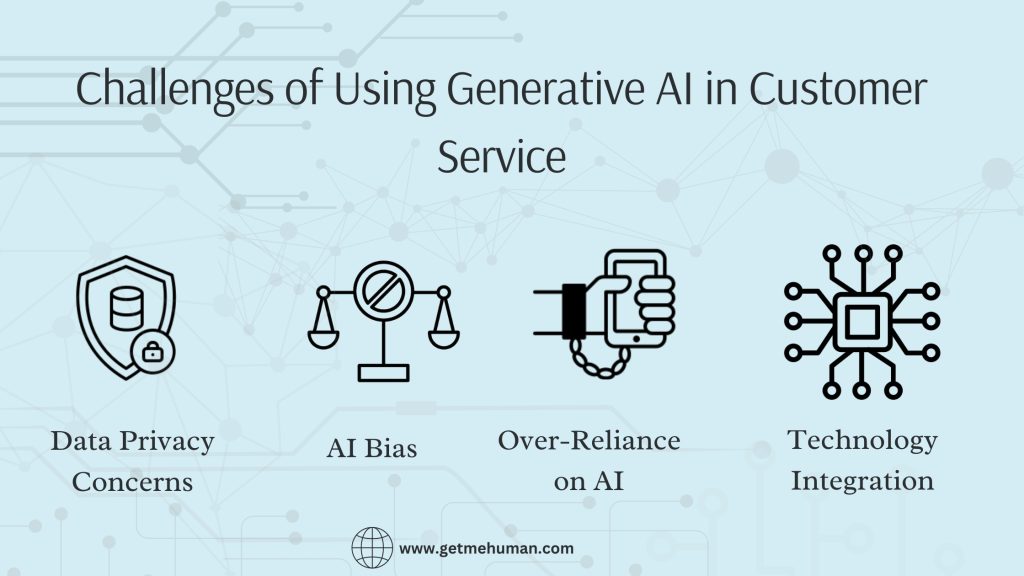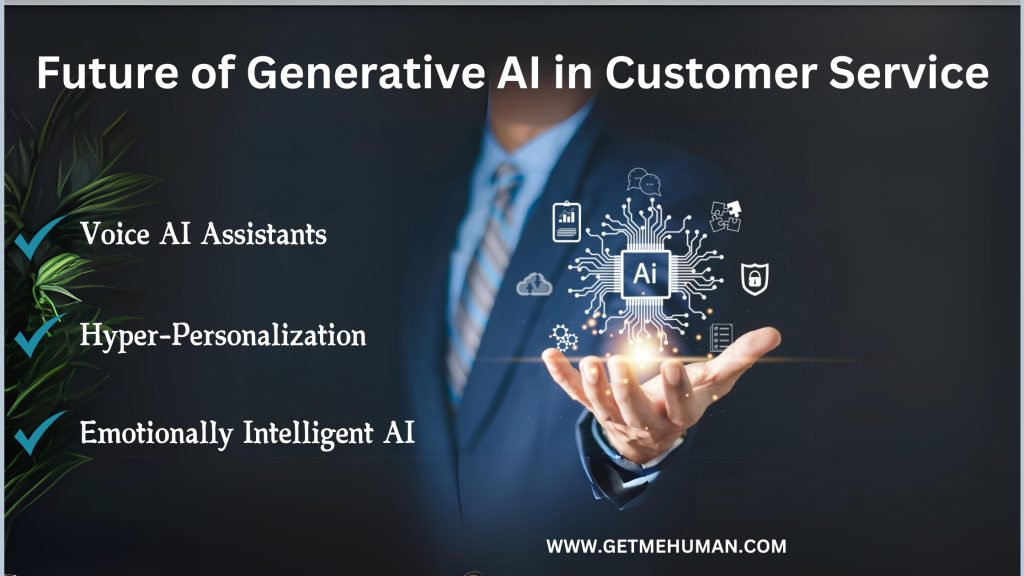How Generative AI Is Transforming Customer Service in 2024

As the business landscape enters 2024, the waves of generative AI sweep across customer service. Working with highly powerful machine learning algorithms and natural language processing, this latest generation of AI can do much more than just answer customer questions; it can actually produce intelligent, context-aware, and human-like conversations.
This blog will walk you through how generative AI is revolutionizing customer support in 2024, what the core benefits are, real-world applications, and what are the challenges businesses should keep an eye on.
1. The Growth of Generative AI in Customer Support
Generative AI, founded on advanced models like GPT-4 and beyond, is fundamentally different from the older AI models most companies have relied on to serve their customers in the past. Unlike the old or traditional AI that is rule-based and reactive, where most of the time it responds according to a scripted message, generative AI uses deep learning techniques and analyzes vast amounts of data for learning. This way, the AI will create new content as long as it is original and generate responses that pretty much mirror the way a human interacts.
For customer service, this would mean:
- Dynamic conversation abilities: not being restricted to pre-tagged responses but able to carry on flowing, meaningful conversations.
- Learning from context: Generative AI learns the essence of a customer’s question and can generate more relevant and accurate answers.
- Continuous learning: New data availability allows generative AI to continuously learn and thus improve itself over time, thereby handling better customer inquiries.
Keep exploring: Key Principles of Excellent Customer Service
2. Benefits of Generative AI in Customer Support

1. Scalability and Cost Efficiency
The key advantage of applying generative AI in a customer service aspect is the ease of scaling. Compared to traditional customer service models, which are dependent on human agents, they face constraints like hours of work, training, and cost of staffing. Implementing AI frees up a vast portion of customer service tasks so that they do not need to hire extra human resources and provide seamless support even 24/7.
For instance:
- 24/7 Availability: Generative AI systems do not sleep or take off, thus making customer service always available. This increases the overall customer experience and decreases reliance on human agents.
- Cost Reduction: Automation of repetitive inquiries such as FAQs and standard responses to account information frees up human agents to answer complex
2. Personalization at Scale
Utilizing customer data, generative AI can create highly personalized experiences at a larger scale. With the aid of AI, responses can be tailored to each customer based on historical interactions with the company, including their purchase behavior and preferences. Hence, personalization can touch new highs in customer service in 2024 in terms of customer satisfaction and loyalty.
Example:
- Tailored Recommendations: AI systems recommend customized product recommendations or services according to a customer’s history.
- Customized Responses: AI may make different tones and styles of communication to fit each preference, therefore improving the experience.
3. Support for Multiple Language:
The more generative AI models increase, the easier it is to support multilingual customer services without needing a different group for every language. In the global economy, this would give a significant boost because companies can target customers from various regions.
- Real-time Translation: The capability of AI to translate correctly and engage with customers in conversations in real-time across numerous languages creates a more comprehensive inclusive service environment.
- Cultural Sensitivity: Some models now factor in cultural context, meaning support becomes more intuitive to the customer.
4. Reduced Human Error and Bias
Human customer service representatives may go wrong because of their emotional influence and the mistakes they make. This sometimes results in inconsistency in services. On the other hand, generative AI eliminates these biases and offers uniform quality, with objective and error-free responses.
3 Applications of Generative AI in Real-life Customer Service
1. Chatbots and Virtual Assistants
Generative AI-powered chatbots and virtual assistants are already the new normal in customer service, cutting across industries. Gone are the older versions; these new AI systems are more conversational and contextually aware of the subject, handling a lot more complex queries and responding in greater detail.
- Automated Query Resolution: The AI bots can answer a large number of customer queries ranging from booking appointments to common troubleshooting issues with minimal intervention by human forces.
- Seamless Handoffs: If the AI is unable to resolve an issue, the whole conversation is handed over smoothly to a human agent where all context would have been provided for immediate resolution.
2. Proactive Customer Support
Generative AI systems do not wait for the customer to report problems. Instead, they can use their observation of user behavior to spot potential problems early on.
- Predictive Maintenance In industries such as telecom and utilities, AI can monitor system performance and give customers a heads-up when a disruption might be about to happen.
- Personalized Follow-ups: AI tools automatically issue follow-up messages to ensure customer satisfaction after the most recent purchases or service interactions.
3. AI-Powered Call Centers
As it is nearing 2024, Generative AI finds its integration into call centers increasingly adding value to both the customer and the agent. For instance, AI listens in real-time for calls from customers and gives recommended responses to the agents in such an event, hence, allowing them to have a better chance at navigating through complex scenarios.
- Suggestions for Response in Real-Time: Real-time conversations can be scanned to ensure agents deliver a response faster and with more accuracy using AI.
- Customer Sentiment Analysis: AI can scan the emotions of customers during the conversation. Agents can alter their tone or approach depending on the emotion of the customer to respond with much empathy.
Read Also: Customer service response times
4. Challenges of Using Generative AI in Customer Service

1. Data Privacy Concerns
Generative AI requires big datasets to function at optimal capacity and hence hold sensitive information about the clients. Data security and privacy are increasingly becoming an issue, with cases like GDPR and CCPA that are amid changing. Companies must make sure that AI systems follow all the data privacy laws ascertaining adequate security for users’ data.
2. AI Bias
While generative AI systems can eventually reduce human biases, they do not eliminate biases altogether in the data they are trained on. If the training data is biased, then the AI may replay those biases in response. Thus, ensuring diversified unbiased training data is the key to fair customer service for all.
3. Over-Reliance on AI
The human interaction in customer service would be lost in over-reliance on AI. There are, of course, occasions where human factors, such as empathy, and ingenuity cannot be traded for artificial intelligence. It is whether there exists a proper balance between the automation by AI and the human centric involvement that will decide the continued positive experience being drawn in for customers from the service.
4. Technology Integration
Introducing AI systems into workflows of customer service might be challenging. It requires careful planning, technological know-how, and significant thought into how these systems merge into a smooth-functioning workflow with other in-house systems-possibly a CRM platform or an internal database.
5. The Future of Generative AI in Customer Service

As we look forward into the future, generative AI in customer service will boom because more comprehensive solutions will be developed. For further development of the models in AI, natural language processing and machine learning, deep personalization will take place and better understand the emotions of customers and their responses.
Key Trends to Watch for:
- Emotionally Intelligent AI: Future AI systems may, by and by, become sensitive to the emotions of a human being and respond with empathy in real-time, thereby giving more human-like interactions.
- Voice AI Assistants: Voice-activated AI assistants will probably be more in vogue, providing hand-free solutions for those customers who require assistance while doing something else.
- Hyper-Personalization: As AI learns from humongous data sets, we can now expect even more hyper-personalization where every customer interaction feels uniquely tailored to their preferences and history.
Conclusion
Generative AI for customer service changes the game in 2024, offering businesses a powerful tool for delivering efficient, personalized, scalable support. It’s transforming everything from how an arcane question is answered to the proactive offer of solutions and reducing operational costs. Data privacy issues and bias are just some of the obstacles to overcome, but the solution holds much promise if applied properly.
By integrating generative AI solutions such as chatbots, virtual assistants, and AI-powered call centers, companies can lift customer service to its potential height, ensuring greater customer satisfaction and loyalty in the digital age. Companies embracing this technology will be the first to benefit from 2024 and more.
FAQs
What is generative AI in customer service?
Generative AI uses advanced algorithms to create human-like responses in real time, enhancing customer interactions by understanding context and providing intelligent solutions.
How does generative AI improve customer support?
It automates tasks, reduces response times, and offers 24/7 service, allowing businesses to scale customer support efficiently and lower operational costs.
Can generative AI replace human agents?
No, generative AI handles routine queries, but human agents are still needed for complex, emotional, or sensitive issues.
What are the benefits of generative AI in customer service
It improves efficiency, and personalized interactions, and reduces human errors, leading to better customer satisfaction.
What are the challenges of using generative AI in customer service?
Key challenges include data privacy, AI bias, and ensuring seamless integration with existing customer service systems.
